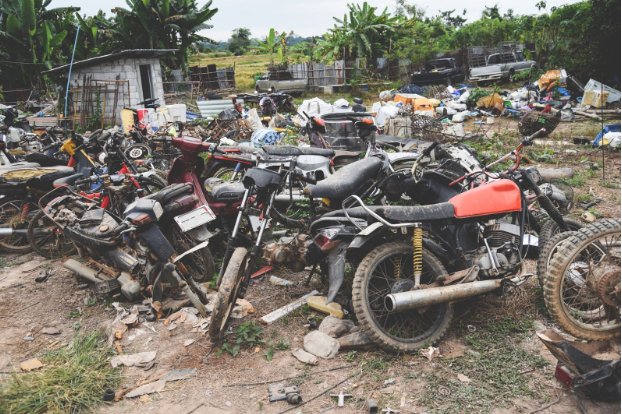In the world of motorcycling, the thrill of the ride is unmatched. However, every rider may eventually face the reality of dealing with a motorcycle that’s seen better days. Often referred to as a “junk motorcycle,” this term encompasses bikes that are totaled, carry salvage titles, or are designated for parts only. Understanding what makes a motorcycle junk is crucial for any owner considering their options, whether selling, restoring, or responsibly disposing of their beloved ride.
Identifying a Junk Motorcycle
The journey begins with determining whether your motorcycle falls into the junk category. This assessment is not always straightforward and involves several key steps:
Valuation and Repairs
Consult an independent valuation guide to ascertain your motorcycle’s current market value. This figure becomes a benchmark for evaluating whether the cost of necessary repairs exceeds the bike’s worth. Motorcycles that require extensive repairs, often exceeding their value, are prime candidates for junk status.
Insurance Company Consultation
For those who’ve experienced an accident, the insurance company’s verdict can be telling. If the insurance declares your motorcycle a total loss, this is a clear indicator it’s considered junk. This classification means the cost of restoring the bike to a roadworthy state is not economically viable from the insurer’s perspective.
Salvage Certificate and Documentation
Understanding your motorcycle’s legal status is another critical step. Request to see the salvage certificate of title or other relevant documents, which should clearly state the bike’s condition. These documents confirm whether your motorcycle is salvageable or destined for parts only.
Options for Removing a Junk Motorcycle
Once the status of your motorcycle as junk is established, several avenues are available for its removal:
Selling
Even in its diminished state, your motorcycle may still hold value. Private sales to individuals interested in restoration projects or the need for specific parts can be viable. This route often requires patience and negotiation skills but can yield a reasonable return.
Donation
Donating your motorcycle offers a hassle-free solution while contributing to a charitable cause. Many organizations facilitate the donation process, handling the necessary paperwork and ensuring the bike’s removal. This option clears space and provides a sense of giving back to the community.
State Recycling Programs
Some states offer vehicle recycling programs designed to accept motorcycles in various conditions. These programs often include pickup or towing services, providing a convenient solution for owners of non-operational bikes. Contacting your local Department of Motor Vehicles (DMV) can provide insights into available programs and reputable motorcycle junkyards.
Motorcycle Junkyards
Salvage yards specialize in collecting and dismantling old or damaged vehicles. Selling your motorcycle to a junkyard simplifies the process, though it may result in lower compensation than other methods. Additionally, many junkyards offer sales and title transfer paperwork support, streamlining the disposal process.
Self-Scraping
For those with mechanical aptitude, dismantling your motorcycle and selling individual parts can be the most lucrative option. This approach allows you to maximize returns by directly selling sought-after components to other enthusiasts or repair shops.
Practical Steps for Junk Motorcycle Owners
With a clear understanding of the options available, taking practical steps toward resolving the fate of your junk motorcycle involves several considerations:
Assessment
Thoroughly assess your motorcycle’s condition, legal status, and potential market value. This initial step is foundational in determining the most suitable course of action.
Market Research
Investigate the demand for your motorcycle’s parts or your community’s interest in junk bikes. Online forums, local classifieds, and motorcycle clubs can be valuable resources for gauging interest.
Legal and Environmental Considerations
Navigating the legal landscape is essential, especially when dealing with salvage titles and parts-only motorcycles. Ensure compliance with state regulations and strive for environmentally responsible disposal methods. Properly recycling or disposing of hazardous materials like oil and batteries is crucial for minimizing environmental impact.
Conclusion
The journey of a junk motorcycle offers several pathways, from selling to recycling. Understanding its value and potential enables owners to make informed decisions, balancing legal, financial, and environmental considerations. Ultimately, carefully handling a junk motorcycle can turn its end into a new beginning, whether through parts repurposing or charitable acts.
FAQs
Can I sell a junk motorcycle that still runs?
Yes, even if your motorcycle is considered junk, you can sell it if it runs or has valuable parts. Private buyers may be interested in it for restoration projects or spare parts.
What should I expect if I sell my motorcycle to a junkyard?
Selling your motorcycle to a junkyard typically results in lower compensation than other methods. Many junkyards provide pick-up services for non-operational bikes but may deduct the cost from the amount offered for your motorcycle.
Is self-scrapping a junk motorcycle worth it?
Self-scrapping can be lucrative if you have the mechanical skills to dismantle the bike and sell individual parts. This method allows you to potentially earn more than selling the entire motorcycle to a junkyard.
Get the right coverage for your motorcycle with tutenagency
New tutenagency customers?
Quote motorcycle insurance online or call (334) 502-5111 to insure a motorcycle.
Disclaimer: This content is for informational purposes only and should not be considered legal or financial advice. Always consult with qualified professionals in legal and financial fields before making any decisions.

